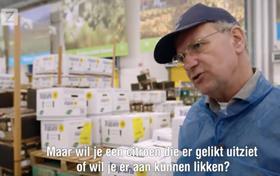
Last month, an investigative report on Dutch TV looking at how supermarkets can increase sustainability in the food supply chain evoked a strong reaction on social media, according to Netherlands-based organics supplier Eosta.
Eosta CEO Volkert Engelsman contributed to the programme, along with Dutch minister of agriculture Carola Schouten.
“Minister Schouten expressed disappointment about the efforts made by supermarkets and was clearly a proponent of a tax on ‘less sustainable products’ in supermarkets,” Eosta stated. “She wants to use the yield from this type of tax to support farmers who wish to operate more sustainably.”
Engelsman argued for more transparency on the impact of food on the environment, bemoaning the supermarkets’ apparent unwillingness to do so.
'Let’s start informing consumers about the effect of their purchasing behaviour on people, society and the environment,” he said during the programme. “There is an urgent need for honest information that enables consumers to make informed purchasing decisions. Failure to do this is taking people for a ride.”
“We must have more transparency,” he urged. “The what-you-don’t-know-won’t-hurt-you era is definitely over. We must stopexternalising social costs to future generations, we must stop offloading damage onto the taxpayer, we must stop offloading the prosperity gap onto the poorer part of the world. No sustainability without transparency.”
However, the Zembla report, titled 'Supermarktmacht' (Supermarket Power), showed how some supermarkets resist greater transparency on the sustainability of organic fruit and vegetables. The programme also demonstrated how cheap supermarket meat effectively shifts responsibility for sustainable choices onto consumers.
The tax proposed by Dutch minister Schouten would aim to make sustainable products like organic fruit and vegetables cheaper, while raising the price of less sustainable items, including meat – a True Cost Accounting approach long advocated by Eosta.
Last year, the first retail trials of True Pricing began, in outlets in Amsterdam and Berlin, but Engelsman believes the current situation requires far greater urgency.
“Why can the information on concealed costs not be made available on supermarket shelves?” he asked. “What is so frightening about that? What is frightening about transparency?”
Investigative journalist Ton van der Ham noted Engelsman’s fervour. “You are getting a bit angry now,” he pointed out.
“Yes, hello!” Engelsman replied. “The goddamned planet is on fire!”



